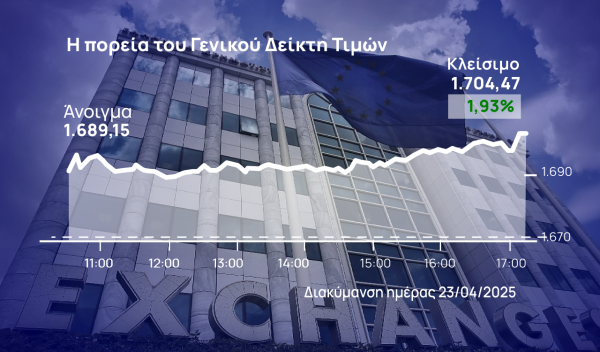
The Piraeus Chamber of Commerce and Industry-EVEP is expressing concerns about even greater price pressures in trade and industry, following the developments of the EU proposals and the decisions of the ECB. According to a relevant announcement, EVEP expects that the activation of the weapon of increasing interest rates will stabilize prices at today’s high levels rather than reduce inflation, while it is certain that borrowing is now becoming more expensive. In the first assessment in the Greek market, due to the liquidity of banks, the first increase is not expected to create a particular rise in fixed interest rates, but it will automatically increase loans linked to Euribor by half to one unit, burdening old borrowers and limiting the credit expansion of businesses .
Policy change
The European Central Bank announced, on July 21, the change in monetary policy in the eurozone with the first increase in interest rates since 2011. The ECB decided to aggressively tackle inflation by increasing the three main interest rates by 50 basis points. Accordingly, the main refinancing operations rate, the marginal financing facility rate and the deposit acceptance facility rate will respectively increase to 0.50%, 0.75% and 0.00% with effect from 27 July 2022. The rally in EU inflation and absolute euro-dollar parity, led to the acceleration of more interest rate hikes. July 2022 thus marked the end of negative interest rates, after eight years (since 2014), when the key rate was reduced to -0.10%. Combined, in fact, with the fewer flows since the re-opening of Nord Stream 1, Europe is being called upon to face a new energy and monetary scenario of restrictions and uncertainty.
The new tool
At the same time, the ECB introduced a new monetary tool called the TPI “Transmission Protection Instrument” in an attempt to contain spreads. The Transmission Protection Facility is an uncapped bond buying tool that will help markets better adjust to future sharp interest rate hikes, faster than expected. After all, the acceleration of the exit from negative interest rates allows the transition to an approach according to which the ECB’s interest rate decisions will be made on a meeting-by-meeting basis, with the next one on September 8.
Greece is among the countries set to benefit from the TPI, which is facing double-digit inflation, as well as Italy, which is facing political unrest. According to the ECB, the mechanism will come with four soft commitments for the governments that will use it. A Bloomberg survey shows that the new monetary tool can mitigate fragmentation shocks, but it will first have to convince the markets of its effectiveness, also containing the spreads of benchmark German bonds, which pose risks to the single currency.
Warning
The International Financial Institute has, however, warned that the increase in interest rates and the normalization of monetary policy may trigger a new debt crisis from the increase in borrowing costs of the countries of the European South. Nevertheless, for Greece, the European Commission in its summer forecast revised its previous growth forecast from 3.5% to 4%, despite higher inflation estimates.
The Greek CPI is expected to be higher at 8.9%, compared to 6.3% previously. Stubborn inflation looks set to slow to 2.4% in 2023, compared with 3.1% in the spring forecast, while ING forecasts 4.2% growth for Greece boosted by tourism. It should be noted that analysts even see inflation at 9.7%, but do not expect the short-term effects to derail this year’s growth, nor that threats from energy and inflation will stop investment and tourism.
Triple front
The President of EVEP, Vassilis Korkidis, regarding the recent developments noted that Europe is faced with a triple front: lower inflows of Russian natural gas, the more expensive money from the aggressive increase in interest rates against inflation and the cohesion in the EU’s energy plan. Furthermore, he added that it must deal with these drastically in order to avoid energy poverty, stagflation and recession. Possibly, like the TRI for spreads, a tool to protect businesses from sharp increases in bank rates should also be created, Mr. Korkidis opined
Latest News

IMF: US Tariffs Shake Global Economy, Outlook Downbeat
IMF slashes global growth forecast to 2.8% as U.S. tariffs create uncertainty and ‘negative supply shock

First Step Towards New Audiovisual Industry Hub in Drama
The project is set to contribute to the further development of Greece’s film industry and establish Drama as an audiovisual hub in the region

Airbnb Greece – Initial CoS Ruling Deems Tax Circular Unlawful
The case reached the Council of State following annulment applications filed by the Panhellenic Federation of Property Owners (POMIDA)

Mitsotakis Unveils €1 Billion Plan for Housing, Pensioners, Public investments
Greek Prime Minister Kyriakos Mitsotakis has announced a new set of economic support measures, worth 1 billion euros, aiming to provide financial relief to citizens.

Alter Ego Ventures Invests in Pioneering Gaming Company ‘Couch Heroes’
Alter Ego Ventures' participation in the share capital of Couch Heroes marks yet another investment by the Alter Ego Media Group in innovative companies with a focus on technology.

Corruption Still Plagues Greece’s Driving Tests
While traffic accidents continue to claim lives on Greek roads daily, irregularities and under-the-table dealings in the training and testing of new drivers remain disturbingly widespread

Pope Francis Died of Stroke and Heart Failure Vatican Confirms
As news of the official cause of death spread, tributes poured in from across the globe. The 1.4 billion-member Catholic Church is united in grief, remembering a pope who championed inclusion, justice, and compassion

Increase in Both Museum Visits, Revenues for 2024
As expected, the Acropolis was the top archeological site in the country, followed by Sounion, Mycenae, the ancient theater of Epidaurus, and Vergina in northern Greece

Where Greece’s Tourists Come From: A Look at 2025’s Top Visitor Markets
The United Kingdom continues to hold the top spot as the largest source of incoming tourism, with 5.6 million seats booked for Greece this summer — up 2.2% from last year. This accounts for 20% of all international air traffic to Greece

Pope Francis: A Pontiff Who Reshaped the Papacy and Sparked a Global Conversation
His first words from the balcony of St. Peter’s Basilica—“Brothers and sisters, good evening”—set the tone for a pontificate that would challenge norms, favor mercy over dogma, and bring the papacy closer to the people.












![Πλημμύρες: Σημειώθηκαν σε επίπεδα ρεκόρ στην Ευρώπη το 2024 [γράφημα]](https://www.ot.gr/wp-content/uploads/2025/04/FLOOD_HUNGRY-90x90.jpg)



![Ξενοδοχεία: Μεγάλο το ενδιαφέρον για επενδύσεις στην Ελλάδα – Η θέση της Αθήνας [γραφήματα]](https://www.ot.gr/wp-content/uploads/2025/03/Athens-hotels-90x90.jpg)








![ΔΝΤ: Καμπανάκι για δημόσιο χρέος από δασμούς και αμυντικές δαπάνες [γράφημα]](https://www.ot.gr/wp-content/uploads/2024/05/30859482_Sharone-perlstein-microfinanace-debt-800x500_c-600x375-1-1.jpg)















 Αριθμός Πιστοποίησης
Αριθμός Πιστοποίησης